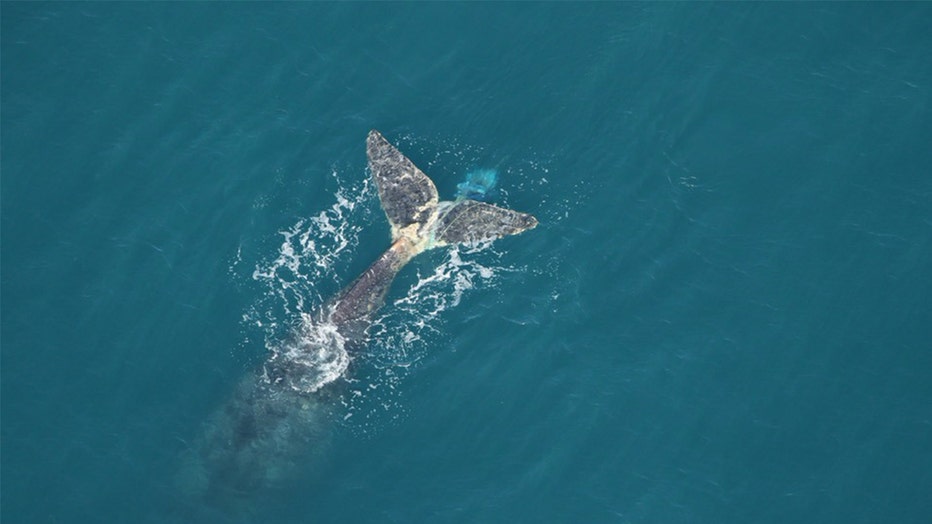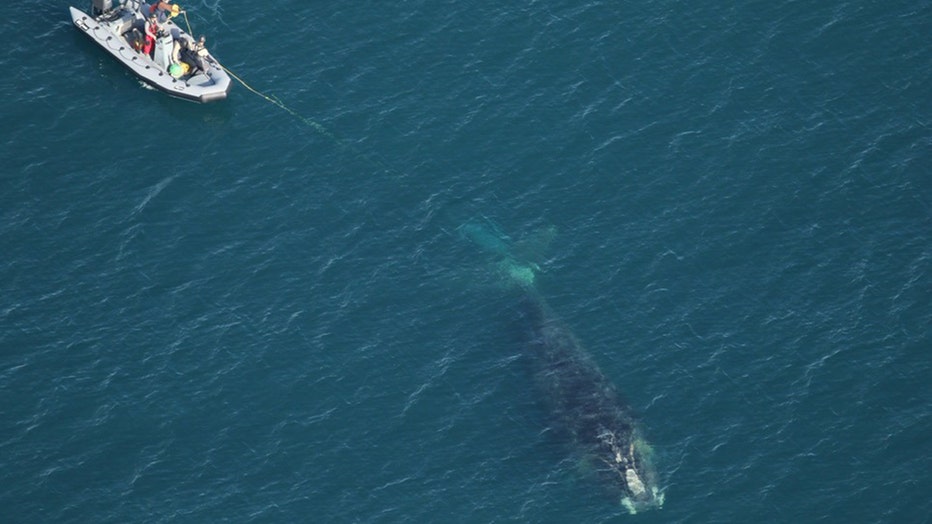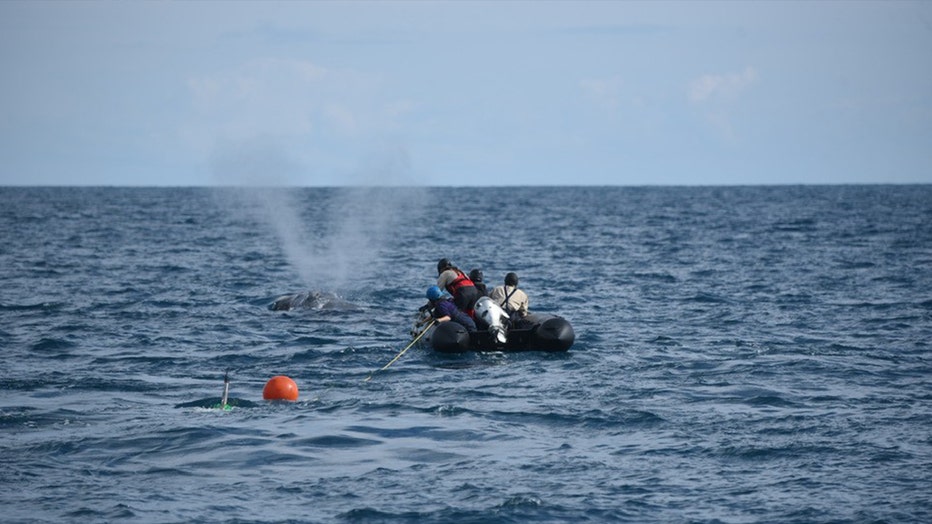Wildlife officials tediously remove fishing rope wrapped around endangered whale’s tail
Fishing gear wrapped around whale's tale
Wildlife officials from Florida to North Carolina worked together over the course of three days to remove fishing rope and lobster pots that were wrapped around an endangered North Atlantic right whale's tale, causing it to rely on its flippers to swim.
CAPE FEAR, N.C. - A North Atlantic right whale is now gear-free after wildlife officials – between Florida and North Carolina – worked for days to monitor and remove fishing rope and lobster pots that were entangled around the endangered species’ tale.
It all took place between Jan. 27-29, state officials said Monday. They responded to the coast of North Carolina and came across "Argo," an adult male. The whale was first sighted near Topsail Island by a survey aircraft and Clearwater Marine Aquarium staff.

An aerial view of Argo, the entangled right whale, near Topsail Island, North Carolina on Jan. 27, 2023. (Photo captured by Clearwater Marine Aquarium under a NOAA permit)
They noticed Argo was traveling slowly and using his flippers to swim rather than his tail. Wildlife officials noted it was unusual behavior that was likely associated with pain or injuries caused by the entangling gear.
The next day, FWC, along with other wildlife officials from Georgia and Duke University, attached a tracking buoy and orange marker to Argo. They also began collecting underwater footage to get a better look at the fishing gear wrapped around his tail.

The moment when responders from Florida Fish and Wildlife and Georgia Department of Natural Resource attach a tracking buoy and orange marker buoy to an entangled right whale. (Photo captured by Clearwater Marine Aquarium under a NOAA permit)
On day three, Argo was about 30 miles away from Frying Pan Shoals. As he surfaced, responders carefully and painstakingly worked to cut the ropes from the case of his tail.
Once that happened, the tissues of the tail continued to hold the fishing gear in place. Responders said they backed off but held onto the rope as it trailed behind the whale.

Trained responders from the Georgia Department of Natural Resources and FWC travel on a small inflatable boat to make cuts to the fishing rope wrapped around the whale's tail. (Photo captured by Duke University Marine Lab under a NOAA permit)
As they prepared other "disentanglement options," the ropes and traps came loose and fell off Argo.
They noted that a small segment of the rope remains on the whale.
"It is unknown if Argo can recover from these injuries, but he has a chance now," according to FWC. "Disentanglement is a last-ditch response. The greater goal is preventing fishing gear entanglement – a leading threat to North Atlantic right whales."
READ: Hawaii whale dies with stomach full of fishing nets, plastic bags
In December, U.S. wildlife officials said the North Atlantic right whale will remain protected under the Endangered Species Act, and the species requires a series of protective steps to stave off extinction.
The whales number only about 340 and they have declined in population in recent years. The National Oceanic and Atmospheric Administration released a review of the whale’s status in December that said the whale "is continuing to decline and has not met many of the recovery criteria outlined" in its recovery plan.
Mariners warn boaters to slow down as rare right whales have been sighted
A right whale mother and calf were spotted off the coast of South Carolina. NOAA officials said 50 North Atlantic right whales were seen south of Nantucket Island in January and enacted a voluntary speed restriction.
Protection of the whale is a source of dispute between conservationists and commercial fishermen because one of the top threats to the animals is entanglement in fishing gear. NOAA performed a required five-year review of the whale’s status that said the animal is continuing to decline because of the threats of fishing gear, collisions with ships, and other stressors.
Environmental groups that have called for more whale protections said the delay would hasten the extinction of the species.
"The science is clear: humans are killing right whales faster than they can reproduce," said Erica Fuller, an attorney with Conservation Law Foundation, "and entanglement in lobster gear is a leading cause."
The Associated Press contributed to this report

